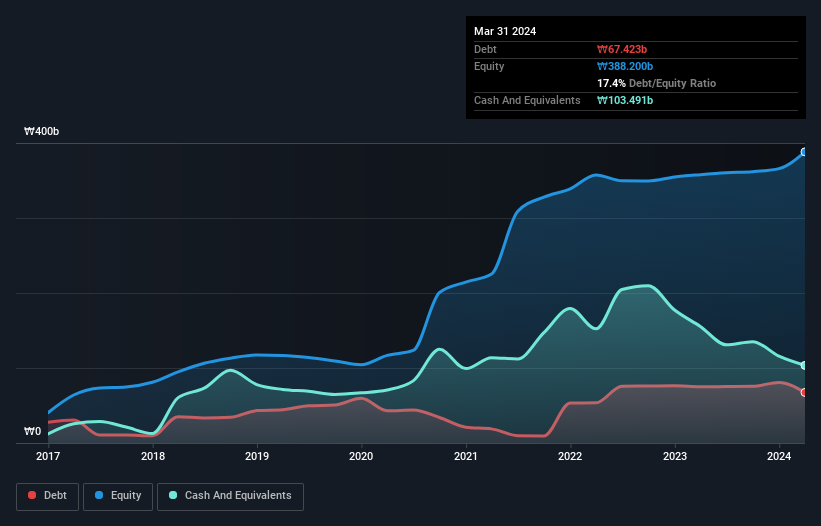Legendary fund manager Li Lu (who Charlie Munger backed) once said, 'The biggest investment risk is not the volatility of prices, but whether you will suffer a permanent loss of capital.' It's only natural to consider a company's balance sheet when you examine how risky it is, since debt is often involved when a business collapses. Importantly, YC Corporation (KOSDAQ:232140) does carry debt. But should shareholders be worried about its use of debt?
When Is Debt Dangerous?
Debt is a tool to help businesses grow, but if a business is incapable of paying off its lenders, then it exists at their mercy. In the worst case scenario, a company can go bankrupt if it cannot pay its creditors. However, a more usual (but still expensive) situation is where a company must dilute shareholders at a cheap share price simply to get debt under control. Of course, the upside of debt is that it often represents cheap capital, especially when it replaces dilution in a company with the ability to reinvest at high rates of return. The first thing to do when considering how much debt a business uses is to look at its cash and debt together.
View our latest analysis for YC
What Is YC's Debt?
As you can see below, YC had ₩67.4b of debt at March 2024, down from ₩74.9b a year prior. But it also has ₩103.5b in cash to offset that, meaning it has ₩36.1b net cash.

How Healthy Is YC's Balance Sheet?
The latest balance sheet data shows that YC had liabilities of ₩89.2b due within a year, and liabilities of ₩36.7b falling due after that. On the other hand, it had cash of ₩103.5b and ₩11.3b worth of receivables due within a year. So its liabilities outweigh the sum of its cash and (near-term) receivables by ₩11.1b.
This state of affairs indicates that YC's balance sheet looks quite solid, as its total liabilities are just about equal to its liquid assets. So it's very unlikely that the ₩1.33t company is short on cash, but still worth keeping an eye on the balance sheet. Despite its noteworthy liabilities, YC boasts net cash, so it's fair to say it does not have a heavy debt load!
It is just as well that YC's load is not too heavy, because its EBIT was down 73% over the last year. Falling earnings (if the trend continues) could eventually make even modest debt quite risky. There's no doubt that we learn most about debt from the balance sheet. But it is YC's earnings that will influence how the balance sheet holds up in the future. So when considering debt, it's definitely worth looking at the earnings trend. Click here for an interactive snapshot.
Finally, while the tax-man may adore accounting profits, lenders only accept cold hard cash. While YC has net cash on its balance sheet, it's still worth taking a look at its ability to convert earnings before interest and tax (EBIT) to free cash flow, to help us understand how quickly it is building (or eroding) that cash balance. During the last three years, YC burned a lot of cash. While that may be a result of expenditure for growth, it does make the debt far more risky.
Summing Up
While it is always sensible to look at a company's total liabilities, it is very reassuring that YC has ₩36.1b in net cash. So although we see some areas for improvement, we're not too worried about YC's balance sheet. The balance sheet is clearly the area to focus on when you are analysing debt. However, not all investment risk resides within the balance sheet - far from it. For instance, we've identified 1 warning sign for YC that you should be aware of.
Of course, if you're the type of investor who prefers buying stocks without the burden of debt, then don't hesitate to discover our exclusive list of net cash growth stocks, today.
New: Manage All Your Stock Portfolios in One Place
We've created the ultimate portfolio companion for stock investors, and it's free.
• Connect an unlimited number of Portfolios and see your total in one currency
• Be alerted to new Warning Signs or Risks via email or mobile
• Track the Fair Value of your stocks
Have feedback on this article? Concerned about the content? Get in touch with us directly. Alternatively, email editorial-team (at) simplywallst.com.
This article by Simply Wall St is general in nature. We provide commentary based on historical data and analyst forecasts only using an unbiased methodology and our articles are not intended to be financial advice. It does not constitute a recommendation to buy or sell any stock, and does not take account of your objectives, or your financial situation. We aim to bring you long-term focused analysis driven by fundamental data. Note that our analysis may not factor in the latest price-sensitive company announcements or qualitative material. Simply Wall St has no position in any stocks mentioned.
Have feedback on this article? Concerned about the content? Get in touch with us directly. Alternatively, email editorial-team@simplywallst.com
About KOSDAQ:A232140
YC
Engages in the development, manufacture, and sale of inspection equipment for semiconductor memories in South Korea and internationally.
High growth potential with excellent balance sheet.
Similar Companies
Market Insights
Weekly Picks

Solutions by stc: 34% Upside in Saudi's Digital Transformation Leader


The AI Infrastructure Giant Grows Into Its Valuation
Recently Updated Narratives


Not a Bubble, But the "Industrial Revolution 4.0" Engine


The "David vs. Goliath" AI Trade – Why Second Place is Worth Billions


The "Sleeping Giant" Wakes Up – Efficiency & Monetization
Popular Narratives


MicroVision will explode future revenue by 380.37% with a vision towards success


NVDA: Expanding AI Demand Will Drive Major Data Center Investments Through 2026



